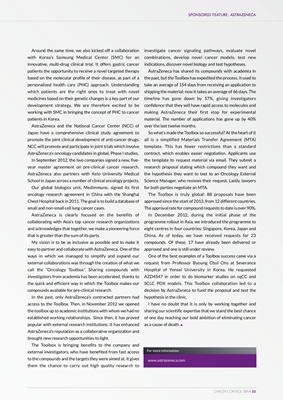
From the Millennium Development Goals to a post2015 agenda
In September 2000, when world leaders came together to
adopt the eight Millennium Development Goals (MDGs),
which included health goals targeting a reduction in child
mortality, combating HIV/AIDS, and improving maternal
health by 2015, cancer and other non-communicable
diseases (NCDs) were largely absent from the agenda.
This had a negative impact both on the level of global
political attention accorded to the prevention and control of
NCDs, and on the levels of bilateral and multilateral funding
directed to tackling the NCD epidemic in low-income
countries. Less than 3% (US$ 503 million out of US$ 22
billion) of overall development assistance for health was
allocated to NCDs in 2007.1 Similarly, although the World
Health Organization's (WHO) budget for tackling NCDs has
increased three-fold since 2011 (to US$ 318 million in the
2014-2015 WHO Programme budget)2 this remains
insufficient for a set of diseases which account for 63% of all
deaths annually.3
Today, as discussions around the post-2015 framework
gain momentum, the cancer community has a unique
opportunity to influence the agenda by feeding into the
consultation process led by the United Nations (UN) to define
the priority development themes for post-2015. Several
expert groups and high-level committees have been
established to guide the consultation process, which has
included wide-ranging national and regional meetings, online
consultations and discussions and generated a series of
reports including the Report of the High Level Panel (HLP) of
Eminent Persons on the Post-2015 Development Agenda4
,
and the Report of the Secretary General5 published in July
2013. The Union for International Cancer Control (UICC) has
worked closely with its members, partners and the NCD
Alliance6 to draw attention to the NCD burden through a
series of think-pieces, policy briefing papers and analyses of
the various reports highlighting the need for health and
NCDs to be integrated across all dimensions of the post-2015
framework.
Whilst these reports acknowledge health as a driver, an
outcome and a measurement of development, and recognize
NCDs as a social, economic and environmental challenge for
BEYOND THE MILLENNIUM
DEVELOPMENT GOALS:
POSITIONING CANCER CONTROL
IN THE POST-2015 AGENDA
CARY ADAMS (LEFT) CEO, UNION FOR INTERNATIONAL CANCER CONTROL AND
REBECCA MORTON DOHERTY (RIGHT) ADVOCACY AND PROGRAMMES
COORDINATION MANAGER, UNION FOR INTERNATIONAL CANCER CONTROL
With the expiry date of the Millennium Development Goals fast approaching in 2015, the
cancer community has a unique opportunity to influence the framework for the successor
development goals, and ensure that cancer prevention and control are no longer
sidelined. The adoption of the UN Political Declaration on Non-communicable Diseases in
2011, which recognized NCDs as a global health and development priority, has helped to
raise public awareness and created a strong political mandate on which to build future
advocacy efforts at the global and regional level and nationally. These efforts must be
supported through innovative partnerships within and beyond the cancer and health field;
the recently updated World Cancer Declaration provides a shared vision on which to build
collaborative partnerships, within the NCD framework, but also for reaching out to new
players in the broader health and development community.
CANCER CONTROL PLANNING
26 CANCER CONTROL 2014